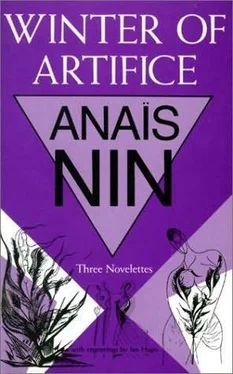Anaïs Nin - The Winter of Artifice
Здесь есть возможность читать онлайн «Anaïs Nin - The Winter of Artifice» весь текст электронной книги совершенно бесплатно (целиком полную версию без сокращений). В некоторых случаях можно слушать аудио, скачать через торрент в формате fb2 и присутствует краткое содержание. Год выпуска: 2007, Издательство: Sky Blue Press, Жанр: Классическая проза, на английском языке. Описание произведения, (предисловие) а так же отзывы посетителей доступны на портале библиотеки ЛибКат.
- Название:The Winter of Artifice
- Автор:
- Издательство:Sky Blue Press
- Жанр:
- Год:2007
- ISBN:нет данных
- Рейтинг книги:4 / 5. Голосов: 1
-
Избранное:Добавить в избранное
- Отзывы:
-
Ваша оценка:
- 80
- 1
- 2
- 3
- 4
- 5
The Winter of Artifice: краткое содержание, описание и аннотация
Предлагаем к чтению аннотацию, описание, краткое содержание или предисловие (зависит от того, что написал сам автор книги «The Winter of Artifice»). Если вы не нашли необходимую информацию о книге — напишите в комментариях, мы постараемся отыскать её.
“A handful of perfectly fold fables, and prose which is so daringly elaborate, so accurately timed… using words as magnificently colorful, evocative and imagist as any plastic combination on canvas but as mysteriously idiosyncratic as any abstract.”
—
The Winter of Artifice — читать онлайн бесплатно полную книгу (весь текст) целиком
Ниже представлен текст книги, разбитый по страницам. Система сохранения места последней прочитанной страницы, позволяет с удобством читать онлайн бесплатно книгу «The Winter of Artifice», без необходимости каждый раз заново искать на чём Вы остановились. Поставьте закладку, и сможете в любой момент перейти на страницу, на которой закончили чтение.
Интервал:
Закладка:
This man who cannot be distinguished in a crowd, who can pass through it like an ordinary man, so quiet, so absorbed, with his hat on one side, his step dragging a little, like a lazy devil enjoying everything softly, why did I trust this man, confide in him… He carries such a fertile world in his head, and yet he can sit like a workman before his beer, and talk like a cart driver to the whores, so that all of them are at ease with him. His presence takes all the straining and willing out of things. He is like the south wind blowing when he comes, melting and softening, bearing joy and abundance.
“Nobody was ever your friend and hers, too,” I said musingly. “The war is too strong between you. One must always make a choice between you.”
He said: “I could not bear to lose you. You are so close to me, yet you mystify and frighten me too, when you are sitting in your black armchair, like a queen… I can’t explain what I mean. I wrote you a letter, a crazy letter which I tore up. I wrote you a crazy letter, a love letter, Djuna.”
I wanted to shout, to run, to dance, to sing. But I was silent. Hans said: “Now you’re veiled again. You’re unreal.”
“Johanna…”
“I can very well imagine Johanna saying to me: ‘I can understand your loving Djuna’.”
We looked at each other. I let the moment dissolve into silence, lose itself in the cold light of the café. All the warmth and the reality were dispersed, dissolved, lost.
But when I saw him walking towards me, the sleeping drug of unreality was dissolved. He would not stop before the café table, I felt. He would never stop walking towards me and into my very being; he would walk right into my being with his soft, lazy walk and purring voice, and his mouth half open.
A strange long silence as if before the end of the world, the end of my immense loneliness. I was dizzy with the end of this lonely world of mine breaking up and crumbling at his coming. He was coming so gently to fill it, to fill it. He tore down the thick veils of dreams and distance between us with an all-engulfing kiss.
“And I thought we were in love with each other’s writing!” I laughed.
We were walking towards his room.
And while we walked together he said: “Your eyes are full of wonder, as if you expected a miracle every day.”
Lying on his iron bed, he said: “I am the last man on earth. Why did you single me out?”
But I was not to be deceived by his humility. All things were born anew in the shabby room when my dress fell on the floor.
I could not hear his words. His voice rumbled over the surface of my skin, like another caress. I had no power against his voice. It came straight from him into me. I could stuff my ears and still it would find its way into my blood and make it rise.
“I’m afraid of breaking you,” he said. “I feel a little embarrassed with you. You seem so fragile.” He covered me with his coat. “Only come to me again, come close to me, come close. I promise you it will be beautiful. I will never hurt you. I could never hurt you. ”
“But I don’t care if you do,” I said laughing. “I want you to be always yourself, and I know there is cruelty in you too. I want to grant you all the privileges; you can be undivided, artist and saint, hungry animal and clown.”
“You urge me, you invite me to be myself, so blithely, so boldly, with a laugh even. You invite me to venture anything. I adore you for that.”
I lit his cigarette. He gave me an awkward smile and said: “I feel humble, Djuna. But it is all so good, so good.” He gave to the word good a mellowness which made the whole room glow, which gave a warm color to the bare window, to the woolen shirt hung on a peg, to the single glass out of which we drank together.
Behind the yellow curtains the sun seeped in; everything was the color of a tropical afternoon.
“How I have wanted this!” he whispered, “I feel you, I feel your hotness right down to my toes.”
The small room, like a deep set alcove. Warm mist, warm blood. The high drunkenness which made Hans flushed and heavy-blooded. His sensual features expanded, his heavy nose palpitated, his throat quivered.
“As soon as you come, I’m jubilant.” And he did a somersault on the bed, two or three of them. He pinched me merrily, looking up at me with a puckish face, his eyes brimming with malice and cunning.
Then suddenly he sat back on the bed, and the drunkenness went out of him. He became pale and sober, his eyes serious and exalted. He looked frail, and his face seemed impenetrable and Oriental.
He opened a book and began to read to me about China. “I stole it for you,” he said, “you must read it.” And his voice was tender. He offered me a slow, almost naive smile, and shook his head over his reading like a very gentle bear.
I went out for wine and food, out into the soft evening. And to everybody I wanted to say: “Give me the best you have. To-day is a day like none other.”
“This is a fine wine, Djuna. Let’s drink to my failure. There’s no doubt about it, no doubt whatever that I am a failure.”
“But I won’t let you be a failure! I won’t let you! I don’t want you to be a failure. I want you to be published, recognized, listened to.”
“You say ‘I want’ as if that made things happen.”
“It does.”
“I talked a lot of nonsense,” he said, “about your frailness. You have strength too, but of a different order. More elusive. No, you won’t break. You have a delicious sense of humor. I want always to see you laughing. You give me something rare. I don’t know if I am capable of making a woman like you happy. I’ve never fucked a woman with a mind, you know. A woman who has written books. They always scared me away. But you… well, you don’t look like a writer at all! You have the loveliest, the loveliest ass. Give me another glass. I don’t know what I expect of you. I expect miracles.”
I was drunk with his glowingness.
“I can’t let you go. I want to go places with you, obscure little places, just to be able to say: ‘here I came with Djuna.’ I’m insatiable. I’ll ask you forthe impossible. What it is, I don’t know. You’ll tell me, probably. You’re quicker than I am. And you’re the first woman with whom I feel I can be absolutely sincere. I’m wondering when you will come to stay overnight, when I can have you for a long spell. It torments me to see you for a few hours and then surrender you. You make me happy because I can talk with you. I feel at ease with you. This is a little drunken, but you know what I mean. You always seem to know what I mean. You know what I have not yet said and you know what I have not yet written. And you’re always so sure that it will be good, Miss Know-it-all, the well-known critic. Are you sure, as sure as all that? Or are you merely in love? Or are you playing a trick on me? Sometimes I don’t believe a word you say. When you’re gone I don’t know what to believe.”
“I don’t know what to believe either. You change from an old, wise man to a young savage: you’re both soft and obscene, tender, timid and cruel too. You’re all things at once. Your writing is explosive, destructive, full of caricature. You’re a bomb-thrower!”
“I believe in violence more than ever. I believe it’s the only holy, pure thing in life.” He paused a moment, reflectively. He looked up at me slyly, then mockingly, then gravely again. He seemed to grow savage inside, deep within, as if his very words were converting his blood into ideas, and the ideas into blood again.
“You’re so full of hatred when you write.”
“It isn’t just hatred. It’s beyond that. I don’t hate and I don’t love. I have no illusions. I feel as if I were the last man on earth. I’ve told you that before. I feel as if I were a scourge, an avenger. A Tamerlane. You want to know why I’m not published? Yon think it’s just because I use obscene language, dirty little four-letter words which the Post Office objects to? Nonsense! It isn’t the obscene words, as they say. It’s the obscene feeling. It’s the violence; it’s what’s raging inside me, that bomb in there that goes off whenever I sit down to write—that’s what they fear. But people are going to listen to me in spite of themselves, because I’m a force. I’m not going to shock them, I’m going to destroy them. I’m going to deal death and dynamite, not drugs and sleeping potions. Violence is pure, violence is holy. I’m savage, moral, earnest, deadly. I want to consume the whole world, devour it, chew it to pieces, and spit it out again—fresh, terrible, beautiful, alive in all its parts, alive and singing. ”
Читать дальшеИнтервал:
Закладка:
Похожие книги на «The Winter of Artifice»
Представляем Вашему вниманию похожие книги на «The Winter of Artifice» списком для выбора. Мы отобрали схожую по названию и смыслу литературу в надежде предоставить читателям больше вариантов отыскать новые, интересные, ещё непрочитанные произведения.
Обсуждение, отзывы о книге «The Winter of Artifice» и просто собственные мнения читателей. Оставьте ваши комментарии, напишите, что Вы думаете о произведении, его смысле или главных героях. Укажите что конкретно понравилось, а что нет, и почему Вы так считаете.











